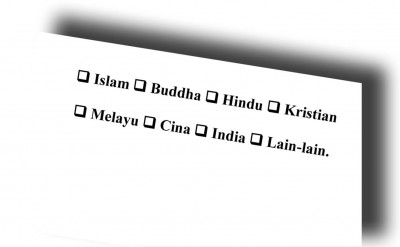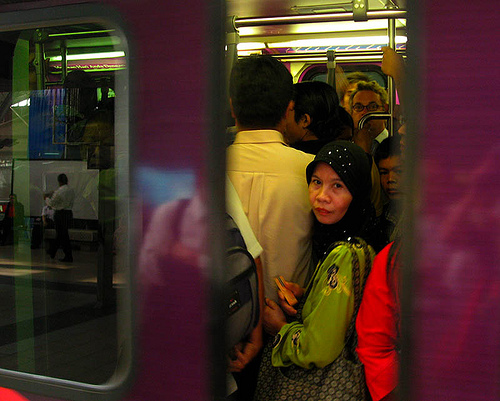New and Improved! Buddha now comes in a box. Enlightenment sold separately.

I stood there just stupefied.
In the background, a television bolted to the wall flashed images of Chef Wan in a foreign country talking about Malaysian cuisine. He’s pointing to diced onions in a bowl. The sound is muted. Over the PA system, the computer’s monotonous female voice called out the next number in the queue.
On the counter in front of me lay the “Form XI” I’d tried to submit in order to obtain an extract of my son’s birth certificate.
I glanced down again at the counter. It was lined with frilly purple curtain cloth – something someone had obviously spent a lot of time doing. Then I noticed the lady’s hand holding a pen and tapping it impatiently on the keyboard.
She widened her eyes.
“So, you Buddha kah?” the NRD officer repeated the question.
“Saya Buddha?” I responded with incredulous cadence.
“Ya lah, you Buddha kah?” she asked one more time.
I looked at the four boxes. So much for thinking it was clever to just leave religion blank. But the matter was sorted out when I complied and checked one. Simple enough.
Or was it?
The whole experience got me thinking about the business of simplifying the complex. Simplifying, I once read, is the process of eliminating the unnecessary so that the necessary may speak.
My mind immediately turned to the colourful Malaysia, Truly Asia tv commercials that depict our country as a melting pot of different cultures and religions; one that got the recipe balanced and just right.
I thought about the boxes a follower of Baha’u’llah’s teachings or a Remun from Sarawak’s Serian district might find appropriate to check. Which part of their racial, cultural and religious identity would they need to treat as unnecessary for the sake of completing such forms?
This begged the next question.
Beyond what we show the world in our travel commercials – the old Iban man dancing the Ngajat, the Bajaus riding their horses on the banks of a river, tourists walking across a hanging bridge in Taman Negara, the skyline of Kuala Lumpur and the Twin Towers, Indian girls dancing the Bharat Natyam and hotel employees bowing with their hands on their hearts – how much do we all really know about the rich fabric of our society?
Most of our knowledge about our fellow Malaysians’ different cultures and religions is slim and confined to our own comfort boundaries. We describe our country as multi-racial, multi-religious and multi-cultural but most of us know next to nothing about these qualities beyond the superficial.
We equate having open houses during religious festivals with tolerance, and knowledge of dishes and cuisine with understanding of another’s culture. Some of us see Hari Raya, for example, as an opportunity to sample curries and cakes, and Gawai as the chance to partake in tuak and merry-making. Not that there’s anything wrong with these viewpoints but isn’t it a point of curiosity how many of us actually bother to ask and find out the real meaning behind the special occasions when we visit our friends’ homes?
By the same token, how many of us know the significance of our own celebrations?
What’s the connection between diyas, rangolis, the Goddess Lakshmi and Diwali? What have love, sacrifice and the death of a spirit child to do with Keamatan? Why are the cries and laughter of children forbidden during Sewang rituals by the Orang Asli? Why is it said that there isn’t a word for “thank you” in the Penan vocabulary?
What we don’t bother to understand, we will never give meaningful respect. And where there is no respect, there is also no conscience.
Is it any wonder then that some of us have not the slightest empathy for the sensitivities of others – finding no qualms about stepping on sacred symbols, torching places of worship and mocking another’s wearing of traditional ornaments?

When we promote the superficial, we are in effect allowing a culture of ignorance to take root; one that percolates through our communities breeding fear and hostility. We become a country that is at odds with its own identity – on the one hand encouraging national integration and on the other hand crying bloody murder when a festive tv commercial for one group’s celebration innocently features harmless references to another group’s culture.
In the end, we become an oppressive society that alienates rather than include. Our plurality is divisively summed up into two: the majority and the minority. And believing the culture of the former as dominant qua superior, we do a trade-off by robbing the latter of their identities – treating them quite simply as unnecessary.
We arrive at a point where certain races, their customs and traditions are entitled to more recognition than others. Reducing the complex facets of Malaysian society into four boxes entrenches that pattern of reasoning which in turn, defines our society in everyday life.
More than slogans and colourful commercials, maybe one step in the right direction is for us to accurately reflect the diversity of our society in our forms. Instead of four boxes, have a box for each of the many groups of people and beliefs that make up our society. Or better still, let us describe ourselves.
Yes, admittedly these are merely words and language, and by no means do they offer a quick solution to our state of affairs. But, they will be a testament to the simple truth that though we aim to be one nation in spirit, it is our pluralism that defines us and gives us strength.
Words empower. And words can unskew our perception; allowing us to understand and appreciate that there really is space for all of us.
So, back to the story. Which box did I check in the end?
[x] Buddha
During the time I spent thinking and trying to fit the rich complexities of my own culture and background into a box, I remembered something a friend of mine said to me:
“Everyone is Buddha.”
The teaching goes that when you become enlightened, you become Buddha. And at that moment, I felt enlightened enough to know the degree of my ignorance. I realised then that we can’t and shouldn’t be simplifying a beautifully complex thing such as our cultures and identities into four boxes.
Just then, I turned to look at the Catholic nun next to me. She crossed out “Dan Lain-lain” and wrote “Bidayuh” over it.
I guess she too, is Buddha.
Adrian sits in a room somewhere in Sarawak watching a dying river flow. Yellowing books on his shelves and blank sheets of paper on his desk, he continues to write if only to search for his voice, despite stillborn sentences never filling up a page. Follow his journey to becoming a writer on The Reading Monk and @Reading_Monk.

Well, when you have a bunch of a certain race (less than 50%)to run the country, this is what happened. Ignorance and stupidity is the name of the game! They can’t even differenciate what is Buddha and a follower of Buddha’s teachings (Buddhist!
Their tolerance is only one way, and that is to follow their way and no other way.What kind of people/religion that preach that sort of logic?
The funny thing was when I was filling in the application form for new TM fixed phone line in my new housing area, i discovered that the form also include half a page requiring disclosure of your race & religion. In addition, how many kids you have, how much you earn etc.
Then the agent who was in charge of processing our forms told us that it was not necessary to fill in those boxes & lines….It's almost like a 'banci' survey.
Yes an empty line should replace boxes, so that people can write in whatever they want. Meanwhile please only vote for candidates that believe in :
1) Freedom from Apartheid/Fascism
2) Freedom from Religious-Persecution/Religious-Supremacy.
3) Equality for all ethnicities and faiths in all aspects of policy, Law and Constitution.
If not run for election yourself.
I have been Buddha all my life. I remember asking my teacher about it once in school, and she asked me back, "How do you say Buddhist in BM?" I didn't know the answer (obviously she didn't either) so I just carried on being a Buddha.
That said, I still don't understand why it is important to know someone's faith in an official form. What difference does it make?